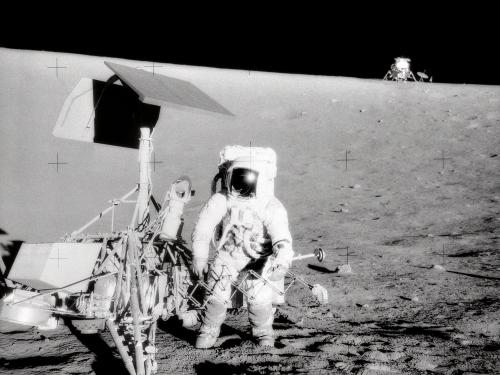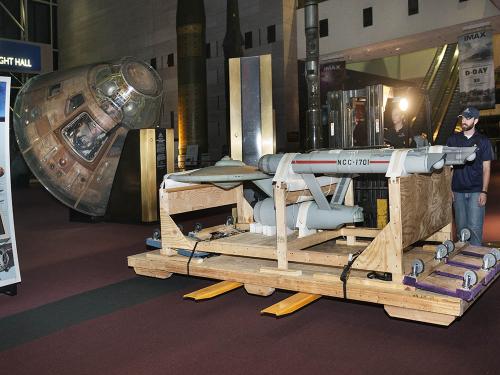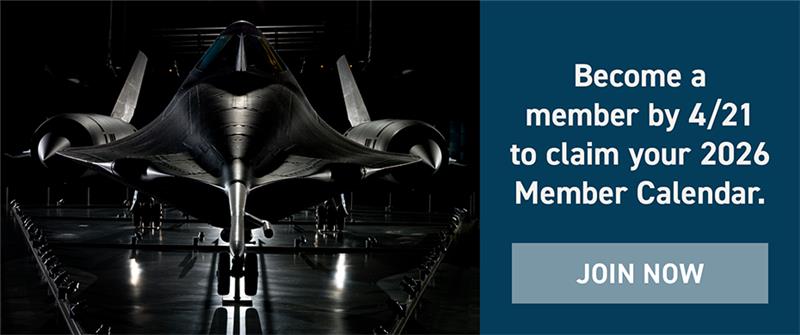
Stories of daring, stories of technological feats, stories of prevailing against the odds ... these are the stories we tell at the National Air and Space Museum. Dive in to the stories below to discover, learn, and be inspired.
Showing 251 - 260 of 319

November 27, 2014
“Pass the turkey, please.” “Do you have room for dessert?” The elements of a traditional Thanksgiving meal are passed around in plastic pouches instead of platters and bowls, but the spirit of this holiday in space is the same as at home. Gathered around (or over!) a makeshift table, crewmates have celebrated Thanksgiving on Skylab, the Space Shuttle, the Russian Mir space station, and the International Space Station (ISS).

November 19, 2014
On November 19, 1969, 45 years ago and three short months after the landing of Apollo 11, Commander Charles “Pete” Conrad and Lunar Module Pilot Alan Bean landed their lunar module “Intrepid” on the Ocean of Storms, just walking distance from the Surveyor III spacecraft. Their near pinpoint landing showed that Moon landings could continue, and with such accuracy that specific objects could be targeted for research.

October 31, 2014

October 24, 2014
Did you know that staff at the National Air and Space Museum enjoy dressing up for the annual Halloween event, Air and Scare, just as much as our visitors? The event, which will kick off tomorrow at 2:00 pm (ET) at the Steven F. Udvar-Hazy Center in Virginia, will bring out lots of superheroes, Star Wars characters, princesses, pumpkins, and many more. It also brings out a creative side in the Museum’s Visitor Services staff, who have teamed up over the years with group costume themes.

October 17, 2014
Out Of Many, One by Jorge Rodriguez-Gerada is a large-scale portrait, made of sand and soil, temporarily displayed on the National Mall for the month of October.

September 12, 2014
On September 11, 2014, the studio model of the Star Trek starship Enterprise, which has been on public display at the Smithsonian's National Air and Space Museum since 1976, was removed for conservation in preparation for its new display location in the Boeing Milestones of Flight Hall, which will open in July 2016. The announcement of the artifact’s inclusion in the transformed Boeing Milestones of Flight Hall was made on April 3, 2014.

July 24, 2014
There is no question that the success of Project Apollo in the 1960s helped to create a culture of competence for NASA that translated into a level of confidence in American capability, and especially in the ability of government to perform effectively, to resolve any problem. Something that almost sounds unthinkable in the early twenty-first century but such was indeed the case in the 1960s.

July 03, 2014
Every Fourth of July, visitors and locals alike crowd the National Mall to watch the fireworks show with the Washington Monument as one of its focal points. The monument reopened to the public in May 2014 as the last vestiges of scaffolding were removed from it, a visible reminder of the damage caused by a 2011 earthquake. Every year, thousands of visitors photograph themselves on the National Mall with the monument in the background. It is no surprise that it is popular in aviation photography as well.

June 07, 2014
What was it like to witness a Space Shuttle launch or landing? For the Moving Beyond Earth (MBE) exhibition about the Space Shuttle, the International Space Station, and future human spaceflight, the team wanted to show how shuttle launches and landings became cultural experiences, not just technological events. Thousands of people gathered, often after having traveled great distances to do so. Many took pictures to record their presence at these historic events. What story would those snapshots tell?

April 29, 2014
In the mid twentieth century, the thought of sending humans into space was only the makings of science fiction. On April 9, 1959, sci-fi and reality merged as NASA introduced the seven American astronauts who would participate in the first human spaceflight program in the United States, Project Mercury.
